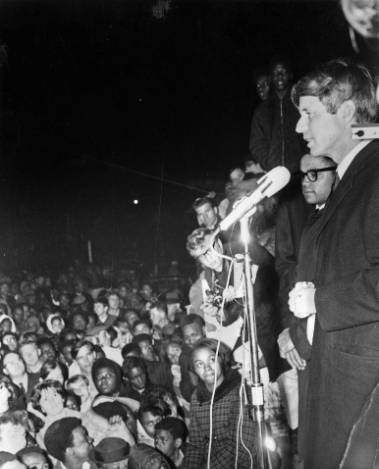
Ignoring advice to cancel his speech due to concerns that violence might break out, Kennedy spoke to a crowd at an outdoor campaign rally at Seventeenth and Broadway streets; many in the crowd did not know that King had been assassinated. Kennedy broke the news of King’s death to the stunned crowd, spoke out on the need for “love and wisdom, and compassion toward one another” and asked them to return peacefully to their homes. Although riots had broken out in a number of major American cities as the news of King’s death had spread, Indianapolis remained peaceful.
On the evening of April 4, 1968, as more than a hundred cities erupted in violence following the murder of Martin Luther King, Jr., Senator Robert F. Kennedy (D-NY) stood before a mostly African-American audience in Indianapolis and made a moving personal appeal for calm.
Kennedy had come seeking votes in Indiana’s May presidential primary. Since state Democratic leaders opposed his candidacy, Kennedy’s staff had arranged a campaign appearance in the heart of an Indianapolis African-American neighborhood to cement backing from black voters who valued the senator’s support for minorities and the disadvantaged. Fearing violence, city officials unsuccessfully urged Kennedy to cancel his speech.
When he arrived at 17th Street and Broadway, the festive crowd of about 2,500 had not heard of King’s death. Speaking extemporaneously from the back of a truck, Kennedy began with the shocking announcement. He recalled that he had a member of his family killed by a white man and asked the crowd to join him in prayer for the nation and in the determination to replace savageness with gentleness in the world.
It was a defining moment for both Kennedy and the city. Kennedy won the Indiana primary but fell victim himself to an assassin in California on June 6. His remarks of April 4 became an epitaph proclaiming his vision for America: a portion of the speech is inscribed on a memorial wall adjoining his grave site at Arlington National Cemetery. For Indianapolis, the speech helped preserve the city as an island of restraint in the turbulent aftermath of the King assassination.
Indianapolis also honors the moment with the Landmark for Peace memorial in Dr. Martin Luther King Park at 601 East 17th Street, Indianapolis. In 1995, President Clinton came to Indianapolis to dedicate the memorial commemorating the site where Robert Kennedy delivered his immortal words on the night of Dr. Martin Luther King Jr’s assassination. As noted by the Kennedy King Memorial Initiative, “Former Indiana Secretary of State, Larry Conrad, had the idea that a monument could commemorate both Dr. Martin Luther King, Jr. and Robert F. Kennedy in the park where Kennedy’s calming remarks were made on the night of King’s assassination. Indiana Pacers CEO Donnie Walsh funded a juried competition for a monument design in 1994 with resources from the newly-formed Pacers Foundation.” Read more
David L. Anderson, University of Indianapolis and Kennedy King Memorial Initiative

